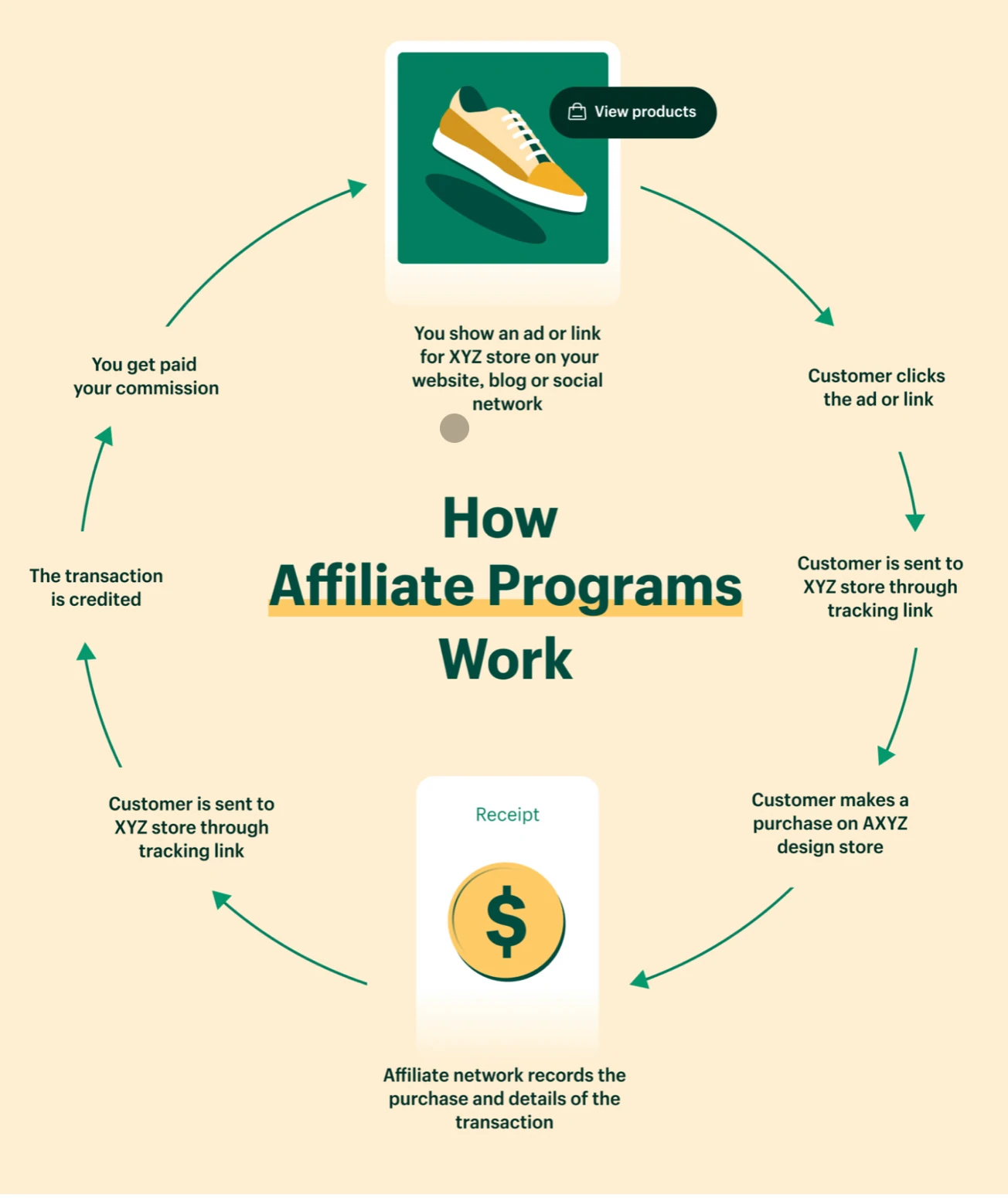Welcome to “Affiliate Marketing Secrets Unleashed”! This is your go-to guide for learning everything about affiliate marketing.
It’s perfect whether you’re just getting started or you already know a bit and want to do even better.
Affiliate marketing is a great way to make money online. It’s flexible, doesn’t cost much to start, and you can earn a lot from it.
In this guide, I’ll cover all the basics: what affiliate marketing is, how it works, and the different types you can try. I’ll also show you how to pick the best products to promote and how to connect with your audience.
No matter if you’re running a blog, making videos, or just sharing stuff online, this guide is full of useful tips and advice to help you do well in affiliate marketing. So, let’s get started and learn how to make the most out of affiliate marketing!
Content Outline
Key Takeaways:
Affiliate marketing has low start-up costs, offering a low-risk opportunity to earn passive income with maximum flexibility and freedom.
Affiliate marketing is divided into several types, such as pay-per-click, pay-per-lead, and pay-per-lead, each with its own advantages.
To succeed in affiliate marketing, choose quality products, build trust with your audience, utilize multiple traffic sources, and continuously learn and adapt.
What Is Affiliate Marketing?

Affiliate Marketing is a business model that allows individuals to earn commissions by promoting and selling other companies’ products or services.
This type of marketing is performance-based, meaning that affiliates are only paid when their promotional efforts result in a sale or a lead. Affiliate marketing has experienced significant growth in recent years as businesses seek cost-effective ways to reach new customers and increase sales.
It has become an integral part of many companies’ marketing strategies, offering a win-win situation where the affiliate earns a commission, and the company gains increased brand exposure and sales.
How Does Affiliate Marketing Work?

Affiliate Marketing operates through a process where affiliates earn a commission for driving traffic or sales to a company’s products or services through their promotional efforts.
When a consumer makes a purchase via an affiliate link, the affiliate receives a percentage of the revenue generated. This compensation model provides an opportunity for individuals to monetize their online presence and marketing skills, creating a means for passive income generation.
Affiliates play a crucial role in expanding a company’s reach and driving sales, as their promotional activities effectively enhance brand visibility and consumer engagement.
What Are the Benefits of Affiliate Marketing?
Affiliate Marketing offers numerous benefits, including the opportunity to generate revenue from sales, access to exclusive products at regular prices, and the potential to unlock secrets for online success and growth.
One of the key advantages of affiliate marketing is the ability to tap into a global market and target diverse audiences.
By leveraging various marketing channels and utilizing innovative promotional strategies, affiliates can reach customers who may not have been accessible through traditional marketing methods. This expands the potential for successful sales and revenue generation.
The flexibility of affiliate marketing allows individuals to earn income passively, creating the opportunity for financial independence and growth.
Similarly, the low overhead costs and minimal financial risk associated with affiliate marketing make it an appealing choice for those looking to kickstart their online business ventures.
1. Low Start-up Costs

One of the great things about affiliate marketing is that it doesn’t cost much to start. This is perfect for people who want to begin their own business journey but don’t have a lot of money to invest.
In the online world today, it’s really easy and affordable to get into affiliate marketing.
You don’t need a big budget to start. This means almost anyone can try their hand at affiliate marketing and see if they can make it work. There are also lots of helpful guides and tips out there that you can use to learn about affiliate marketing and how to be good at it.
So, if you’re thinking about starting your own online business, affiliate marketing is a great option because it’s easy to get into and doesn’t need a lot of money upfront. Plus, you can learn a lot along the way!
2. Passive Income Potential
Affiliate marketing presents significant passive income potential, aligning with the digital age’s focus on scalable revenue streams and showcasing the earning potential through advanced strategies.
In the context of affiliate marketing, leveraging various channels and platforms enhances the prospects of generating passive income.
Diversifying promotional efforts through organic search, social media, and email marketing can optimize the likelihood of consistent earnings.
By strategically creating and aligning content with relevant products or services, affiliates can cultivate sustainable passive income streams.
Embracing automation and analytics to refine targeting and optimize conversions further enables affiliates to tap into the true potential of passive income within affiliate marketing.
3. Flexibility and Freedom
Affiliate marketing offers unparalleled flexibility and freedom, as demonstrated by real-life case studies and success stories, showcasing the unleashed potential for individuals to carve their path to success.
Through affiliate marketing, entrepreneurs and business owners have broken free from traditional constraints, tapping into a global audience and converting their passion into profit.
Take, for example, a budding fitness enthusiast who leveraged affiliate partnerships to promote health supplements, not only inspiring others but also reaping substantial financial rewards.
4. No Need for Own Product
In affiliate marketing, you don’t have to worry about making your own products. Instead, you can join different affiliate programs and promote other companies’ products.
This is great because it means you can focus on just selling and marketing without the hassle of creating and looking after a product.
When you’re an affiliate marketer, you use special links that track how many sales you bring in. This helps you see how well your marketing is working and make changes if you need to.
Plus, you don’t have to spend a lot of money to start, and you don’t have to deal with making the product or storing it.
It’s a good way to make money without having to deal with all the complicated parts of running a business.
How to Get Started with Affiliate Marketing?
Getting started with affiliate marketing involves selecting a niche, identifying suitable affiliate programs, creating quality content, and effectively promoting affiliate links to attract and convert potential customers.
After choosing a niche, it’s essential to conduct thorough research to understand the target audience’s needs.
This includes analyzing keywords, competitor strategies, and market trends to refine content creation and promotion tactics.
Next, one should seek out reputable affiliate programs that align with the chosen niche and offer attractive commission structures.
In terms of content creation, the focus should be on providing valuable information and engaging storytelling.
This could involve writing blog posts, creating videos, or developing social media content that resonates with the target audience. It’s vital to establish trust and credibility to encourage click-throughs on affiliate links.
Strategic promotion involves leveraging various channels, such as SEO, email marketing, and social media, to showcase the benefits of the products or services offered through the affiliate programs.
Incorporating persuasive call-to-actions and integrating affiliate links seamlessly within the content can enhance the chances of driving conversions.
1. Choose a Niche

Starting affiliate marketing begins with picking a niche that matches what you like and knows a lot about. Choosing a niche you’re passionate about is key. It makes the whole experience more fun and something you’ll want to stick with. When you really care about your niche, your marketing feels more real and can be more successful.
It’s also helpful to learn about the niche you choose. Understanding how it works and what people in that niche want can really help.
This knowledge lets you create better marketing strategies and connect with others who are also into the same things.
Learning and sharing ideas with a community of marketers can be a big help, especially when you’re just starting out.
2. Find Affiliate Programs
Identifying suitable affiliate programs is crucial for affiliate marketing success, representing a strategic step for businesses and marketers to expand their reach and drive growth through diversified partnerships.
When exploring potential affiliate programs, it’s essential to thoroughly research the products or services offered by the merchants to ensure alignment with the target audience and brand values.
Evaluating the commission structure and payment terms is integral to making an informed decision.
Gathering insights into the merchant’s reputation, customer service, and track record can further guide the selection process.
3. Create Quality Content

Making great content is really important if you want to do well in affiliate marketing. Good content helps get more people to visit your site and makes them trust you more. It’s all about creating stuff that people find helpful and interesting, which can make them more likely to buy what you’re promoting.
For example, if you’re writing a blog post or making a video, you should focus on what your audience needs and likes. Share tips and advice, and show that you know your stuff.
This could be something like a detailed how-to guide, a review of a product, or an article answering common questions.
The better your content is, the more people will see you as an expert, which can lead to more sales. So, always aim to provide valuable and useful information in everything you create.
4. Promote Your Affiliate Links

Promoting affiliate links effectively involves leveraging diverse channels and platforms to maximize visibility, engagement, and sales conversion, representing a strategic approach for businesses and affiliates to harness the potential of affiliate programs.
By introducing affiliate links across various platforms such as social media, blogs, email newsletters, and podcasts, businesses, and affiliates can reach a wider audience and diversify their promotional efforts.
It’s essential to tailor the content for each platform, ensuring that it resonates with the specific audience and aligns with the platform’s norms and expectations.
Optimizing SEO with relevant keywords and entities in the content can further enhance the visibility of affiliate links.
This entails conducting keyword research and strategically integrating keywords into the promotional materials to maximize organic traffic and reach potential customers actively seeking the products or services.
5. Track Your Results and Adjust Strategies
Monitoring and analyzing performance metrics is crucial in affiliate marketing, enabling marketers with the knowledge and tools to refine strategies, optimize outcomes, and align with success stories that showcase effective tactics and results.
By closely tracking metrics such as click-through rates, conversion rates, and average order value, marketers can gain valuable insights into the performance of their affiliate campaigns.
This data-driven approach allows for the identification of high-performing tactics, as well as areas for improvement.
With the availability of sophisticated analytics platforms and reporting tools, affiliates can make informed decisions and pivot their strategies based on real-time data.
This iterative process of testing, measuring, and adjusting is essential for staying competitive and maximizing the impact of affiliate marketing efforts.
What Are the Secrets to Success in Affiliate Marketing?
The secrets to success in affiliate marketing lie in choosing the right products, building trust with the audience, utilizing multiple traffic sources, and continuously learning and adapting strategies, as evidenced by compelling case studies and the accumulated knowledge of successful marketers.
Effective product selection requires thorough research into market demand, competition, and customer preferences, ensuring that the products resonate with the target audience’s needs and interests.
Building trust with the audience involves transparent communication, consistent delivery of value, and leveraging social proof to establish credibility and rapport with potential customers.
Diversifying traffic sources across channels like search engines, social media, and email marketing not only broadens reach but also reduces dependence on a single source, safeguarding against sudden fluctuations or algorithm changes.
Continuous learning and adaptation involve staying updated with industry trends, testing new approaches, and leveraging data-driven insights to refine strategies for sustained performance and growth.
1. Choose the Right Products
Selecting the right products to promote is a pivotal element for success in affiliate marketing, showcasing the guidance available through resources like the ‘Blueprint Online Success’ E-Book to steer marketers toward profitable and impactful product selections.
Choosing products that resonate with your target audience is crucial to securing conversions and building a loyal customer base.
The ‘Blueprint Online Success E-Book provides invaluable insights into market trends and consumer behavior, enabling marketers to make informed decisions.
By aligning product choices with the interests and needs of potential buyers, affiliates can maximize their earnings and establish long-term revenue streams.
The right products not only generate sales but also enhance the credibility and trustworthiness of the affiliate marketers, fostering stronger relationships with their audience.
2. Build Trust with Your Audience

Building trust with your audience is really important for being successful in affiliate marketing. When people trust you, they’re more likely to take your advice and buy the products you recommend. Sharing real success stories is a great way to build this trust.
When your audience hears about how a product or service helped someone, they’re more likely to believe it could help them, too.
For affiliate marketers, it’s all about making a strong, honest connection with your audience. This means being clear about what you’re promoting and why.
You should offer useful information, give honest reviews, and answer questions people might have. Doing this helps create a positive image for your brand.
People start to see you as someone they can trust, not just someone trying to sell them something. In the end, this trust can lead to more people following your recommendations, which means more sales and a stronger relationship with your audience.
3. Utilize Multiple Traffic Sources
In affiliate marketing, it’s really smart to use different ways to get people to see your links. This means not just sticking to one method, like only using social media.
When you spread out your efforts across different places – like search engines, paid ads, social media, emails, and working with influencers – you have a better chance of reaching more people.
I’ve learned that by mixing it up and using various methods, I don’t depend too much on just one way to get traffic. This helps me reach all kinds of people in different places, making my affiliate links more visible and likely to get clicked on.
So, my tip for anyone in affiliate marketing is to try a bunch of different ways to get your links out there. It can really help grow your business and get your products in front of more eyes. Plus, it’s a great way to keep things interesting for you, too!
4. Continuously Learn and Adapt

In affiliate marketing, it’s super important to keep learning and changing with the times. The online world is always changing, with new technology and ways people behave online.
To be good at affiliate marketing, you need to stay up-to-date and be ready to try new things.
I’ve found that the more I learn and try new strategies, the better I do. It’s all about not being afraid to experiment with new ideas or tools that come out. This way, you can reach more people and get better at selling products.
So, my advice? Always be curious, keep learning, and don’t be scared to change your tactics. It’s a great way to grow your affiliate marketing business and make more money over time. Remember, what worked yesterday might not work tomorrow, so stay on your toes!
Also read:
- How To Build an Affiliate Marketing Website
- How To Start Affiliate Marketing
- Major Scams In Affiliate Marketing
- Best Affiliate Programs For Bloggers
- Best Affiliate Networks For Earning Passive Income

